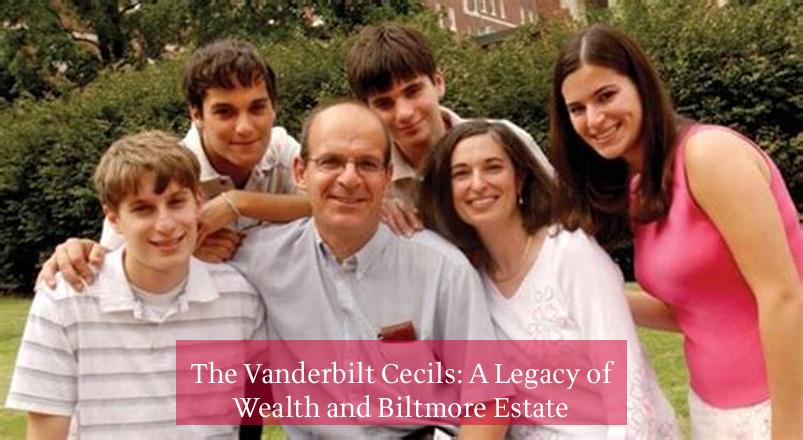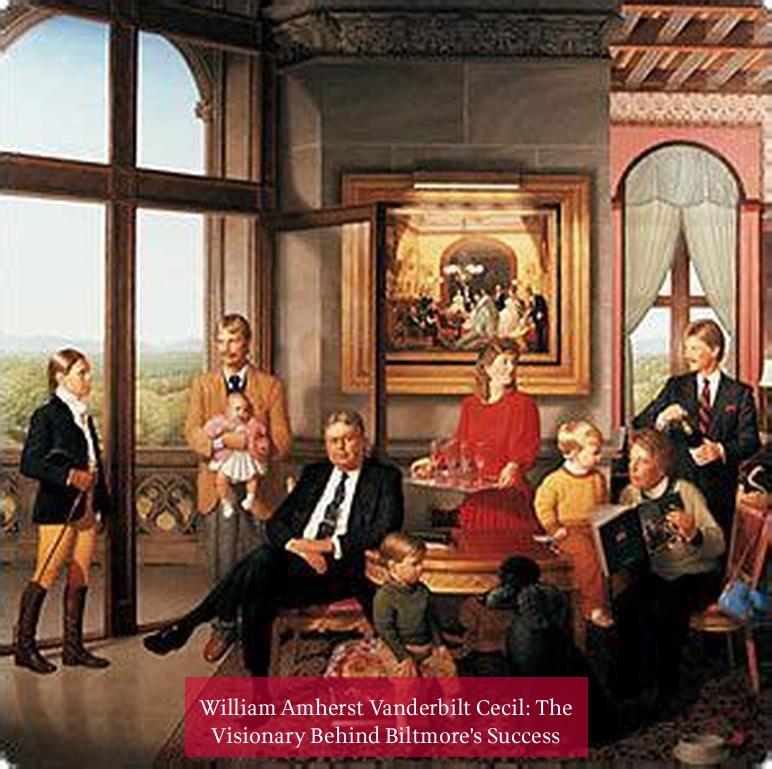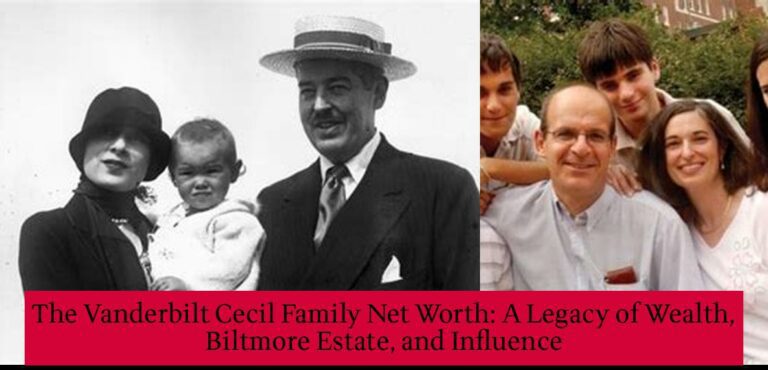Uncovering the opulent world of the Vanderbilt Cecil family and their remarkable net worth is like stepping into a real-life saga of wealth, power, and legacy. From the iconic Biltmore Estate to their enduring influence in business and diplomacy, the Vanderbilt Cecils have left an indelible mark on history. Join us as we delve into the captivating story behind their immense wealth and the enduring legacy of this extraordinary family. Whether you’re a history buff, a fan of grand estates, or just curious about the secrets of the ultra-rich, this is a tale you won’t want to miss.
Key Takeaways
- William AV Cecil Jr’s net worth was estimated at $10.1 billion.
- The Biltmore Estate is valued at more than $64 million, with a total value of public areas nearly $300 million.
- Biltmore remains a family business, with the fourth and fifth generations of George Vanderbilt’s descendants involved in day-to-day operations.
- George Vanderbilt’s great-grandson, Bill Cecil Jr, is the current CEO of Biltmore Company.
- The estate is still family-owned, and the elder Cecil passed away in 2017.
- George Vanderbilt’s grandson, William Amherst Vanderbilt Cecil, was the owner of the Biltmore Estate.
The Vanderbilt Cecils: A Legacy of Wealth and Biltmore Estate

The Vanderbilt family, known for their immense wealth and opulent lifestyle, has a long and intertwined history with the Cecil family. The Cecils, descendants of British nobility, became part of the Vanderbilt lineage through marriage and played a pivotal role in shaping the family’s legacy. One of the most prominent figures in this connection was William Amherst Vanderbilt Cecil, who inherited the iconic Biltmore Estate and oversaw its transformation into a thriving business.
— How Much Are the Vanderbilts Worth? Unveiling the Enduring Legacy of America’s Richest Dynasty
The Biltmore Estate: A Gilded Age Masterpiece
Biltmore Estate, located in Asheville, North Carolina, is a breathtaking example of Gilded Age architecture and a testament to the Vanderbilt family’s grandeur. Constructed in the late 1800s by George Vanderbilt, the estate spans over 8,000 acres and boasts a magnificent 250-room mansion. The Biltmore House, as it is known, is the largest privately owned home in the United States and a National Historic Landmark.
The estate’s opulent interiors, designed by renowned architect Richard Morris Hunt, showcase a blend of European and American styles. The grand halls, adorned with intricate carvings and priceless artwork, reflect the Vanderbilt’s exquisite taste and lavish lifestyle. The surrounding gardens, designed by Frederick Law Olmsted, complement the architectural splendor with their manicured lawns, vibrant flowerbeds, and serene walking trails.
Reading List: Vicente Fernandez Jr Net Worth: Unraveling the Financial Legacy and Personal Turmoil
William Amherst Vanderbilt Cecil: The Visionary Behind Biltmore’s Success

William Amherst Vanderbilt Cecil, born in 1928, inherited Biltmore Estate from his grandfather, George Vanderbilt. Under Cecil’s leadership, the estate evolved from a private residence into a thriving tourist destination and cultural institution. Cecil expanded the estate’s offerings, introducing new attractions such as the Biltmore Winery, the Antler Hill Village, and the Biltmore Equestrian Center.
Cecil’s vision extended beyond the estate’s physical boundaries. He recognized the potential of Biltmore as a cultural hub and established the Biltmore Forest School, the Asheville Symphony Orchestra, and the University of North Carolina Asheville. His contributions to the region’s cultural and economic development earned him widespread recognition and respect.
The Legacy of the Vanderbilt Cecils: A Family Enterprise
Today, Biltmore Estate remains a family-owned enterprise, with the fourth and fifth generations of George Vanderbilt’s descendants actively involved in its operations. Bill Cecil Jr., George Vanderbilt’s great-grandson, serves as the current CEO of the Biltmore Company. The family’s commitment to preserving the estate’s legacy and sharing its beauty with the public is evident in their ongoing efforts to maintain and enhance the property.
The Vanderbilt Cecils have played an instrumental role in shaping the history of Biltmore Estate, transforming it from a private retreat into a beloved cultural landmark. Their legacy of wealth, vision, and stewardship continues to inspire generations and ensure that Biltmore remains a symbol of American grandeur and hospitality.
The Biltmore Estate: A Thriving Business and Cultural Institution
Biltmore Estate has evolved into a multifaceted enterprise that encompasses various revenue streams beyond tourism. The estate’s winery, established in 1888, produces award-winning wines that are sold both on-site and through national distribution channels. The estate also operates several restaurants, offering a range of dining experiences from casual to fine dining.
In addition to its commercial ventures, Biltmore Estate plays a significant role in the cultural landscape of Asheville and the surrounding region. The estate hosts a variety of events throughout the year, including concerts, exhibitions, and educational programs. The estate’s commitment to the arts is evident in its support of local artists and its collaboration with cultural institutions.
The estate’s vast acreage also provides opportunities for outdoor recreation and environmental conservation. Visitors can enjoy hiking, biking, and horseback riding on the estate’s trails. Biltmore’s commitment to sustainability includes initiatives such as responsible land management, water conservation, and wildlife protection.
The Vanderbilt Family: A Dynasty of Wealth and Influence
The Vanderbilt family’s wealth originated from Cornelius Vanderbilt, a shipping and railroad magnate who amassed a fortune in the mid-19th century. His descendants continued to expand the family’s business empire, investing in various industries such as railroads, shipping, and real estate. The family’s wealth and influence reached its peak during the Gilded Age, a period of rapid economic growth and industrialization in the United States.
The Vanderbilts were known for their lavish lifestyle and their patronage of the arts and culture. They built opulent mansions, collected fine art, and supported charitable causes. The family’s legacy includes the establishment of several prestigious institutions, such as Vanderbilt University and the Metropolitan Museum of Art.
Today, the Vanderbilt family remains one of the wealthiest and most influential families in the United States. While their fortune has been divided among numerous descendants, the family’s legacy continues through their philanthropic endeavors and their continued involvement in business and public affairs.
The Cecil Family: A Legacy of Diplomacy and Business
The Cecil family, originally from England, has a long and distinguished history in diplomacy and public service. The family’s most famous member was William Cecil, 1st Baron Burghley, who served as Secretary of State under Queen Elizabeth I. The Cecils later established themselves in the United States through marriage and business ventures.
More updates: Patricia Lee Captain Net Worth: Unveiling the Financial Success of Sea Captain Rip Carlton
The Cecil family’s connection to the Vanderbilts began in 1895 when Cornelia Vanderbilt, the daughter of William Henry Vanderbilt, married John Francis Amherst Cecil. Their son, William Amherst Vanderbilt Cecil, inherited Biltmore Estate and played a pivotal role in its development.
Today, the Cecil family continues to be involved in business and philanthropy. Members of the family have served on the boards of various corporations and non-profit organizations. The Cecil family’s legacy of public service and business acumen has left a lasting impact on both the United States and the United Kingdom.
1. How are the Cecils related to the Vanderbilts?
The Cecils are related to the Vanderbilts through George W. Vanderbilt, who built Biltmore House in the 1890s. William AV Cecil Jr was the youngest son of Cornelia Vanderbilt Cecil and the Honorable John Francis Amherst Cecil, and the grandson of George W. Vanderbilt.
2. How much is the Biltmore worth in today’s money?
The Biltmore Estate is valued at more than $64 million, and with hotels, restaurants, outbuildings, and private residences, the total value of public areas of Biltmore Estate is nearly $300 million.
3. Who owns the Vanderbilt mansion?
The estate is still family-owned, with George Vanderbilt’s great-grandson, Bill Cecil Jr, serving as the current CEO of Biltmore Company. His father, William Amherst Vanderbilt Cecil, was responsible for most of the dramatic growth of Biltmore.
4. Does the Vanderbilt family still own Biltmore?
Yes, Biltmore remains a family business, with the fourth and fifth generations of George Vanderbilt’s descendants involved in day-to-day operations.
5. What was William AV Cecil Jr’s net worth?
William AV Cecil Jr’s net worth was estimated at $10.1 billion. He passed away in 2017, leaving behind a significant legacy in the Biltmore Estate.
